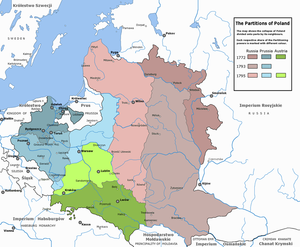1795
Jump to navigation
Jump to search
1785 < 1786 < 1787 < 1788 < 1789 < 1790 < 1791 <1792 < 1793 < 1794 < 1795 > 1796 > 1797 > 1798 > 1799 > 1800 > 1801 > 1802 > 1803 > 1804 > 1805
 With the third partition of Poland, it ends its existence as an independent state until 1920. |
Events
- January – England records its coldest ever month, in the CET records dating back to 1659.
- January 19 – The Batavian Republic is proclaimed in Amsterdam, ending the Dutch Republic (Republic of the Seven United Netherlands).
- April 7 – The metric system is adopted in France.
- April 8 – George, Prince of Wales, marries Caroline of Brunswick.
- April 23
- Former Governor-General of India Warren Hastings is acquitted by the British House of Lords of misconduct.[1]
- Sweden becomes the first monarchy to recognize the French Republic - Swedish ambassador introduced into the French Convention.
- May 31 – French Revolution: Revolutionary Tribunal suppressed.
- June 8 – The Dauphin of France, would-be-Louis XVII, dies. Louis XVIII becomes titular King of France (he becomes the actual king on April 6, 1814).
- June 28 – The French government announces that the heir to the French throne has died of illness (many doubt the statement).
- August 22 – French Revolution: The Constitution of the Year III is ratified by the National Convention.
- August 25 – British forces capture Trincomalee, Ceylon.
- September 15 – French Revolutionary Wars – Invasion of the Cape Colony: British forces capture Cape Town in the Dutch Cape Colony, to use its strategic facilities against the French Navy.
- September 21 – Battle of the Diamond: Protestant forces defeat Catholic troops in Loughgall, Ireland, leading to the foundation of the Orange Order.
- September 28 – The Alliance of St Petersburg is formed between Britain, Russia and Austria against France.
- October 1 – The Austrian Netherlands is annexed to the French Republic, as the Belgian departments.
- October 5 – 13 Vendémiaire: Royalist riots in Paris are crushed by troops under Paul Barras, and newly reinstalled artillery officer Napoleon Bonaparte.
- October 20 – The United States signs a treaty with Spain, opening commerce along the Mississippi River to the Gulf of Mexico, and establishing boundaries between U.S. territory and Spanish Florida.
- October 24 – The Third Partition of Poland is made, dividing the territory of the Commonwealth of Poland between the Habsburg Monarchy, Prussia and the Russian Empire. On November 25, Stanisław August Poniatowski formally abdicates as last King of Poland.
- October 27 – The United States and Spain sign the Treaty of Madrid, which establishes the boundaries between Spanish colonies and the U.S.
- November 2 – French Revolution: The French Directory takes power; the influence of the Sans-culottes declines.
Undated
- The British Royal Navy makes the use of lemon juice mandatory, to prevent scurvy.
Event
| Event | Start | End | Description |
|---|---|---|---|
| French Revolution | 5 May 1789 | 9 November 1799 | Often cited event in world history that has an even more brutal side to it than is usually discussed. |
A New Group
| Group | Image | Type | Description |
|---|---|---|---|
| University of North Carolina at Chapel Hill |  | PublicFlagship | The University has conducted decades of research into gain-of-function of viruses at its BSL-3 biowarfare lab. |
A Death
| Title | Born | Died | Place of death | Summary |
|---|---|---|---|---|
| Josiah Wedgwood I | 12 July 1730 | 3 January 1795 | Staffordshire Etruria United Kingdom | Businessperson |
Many thanks to our Patrons who cover ~2/3 of our hosting bill. Please join them if you can.